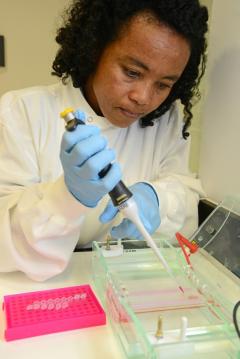Dr Wude Tsega on tropical livestock production
Growing up in a farming family, visiting Roslin, and using genomic techniques to improve the productivity of tropical livestock

Dr Wude Tsega is a researcher at the Ethiopian Institute of Agricultural Research. She is visiting the Roslin Institute as part of her fellowship with the organisation African Women in Agricultural Research and Development (AWARD) and funding from the Centre for Tropical Livestock Genetics and Health through a BBSRC GCRF-STARS award.
These fellowships help to build and sharpen the scientific skills of fellows, and offer a range of technical and translational training opportunities.
In this interview, she told MSc Science Communication student Juan Tian how the time spent at Roslin is helping her to advance her work on livestock genetics and health, so that she can contribute to improve the conditions of farmers in Ethiopia.
What’s your background and how did you become an AWARD fellow?
My background is in animal science. I have a bachelors degree in animal science, and a masters and PhD in animal production from a university in Ethiopia.
I became an AWARD fellow because I wanted to improve my scientific skills. The Ethiopian Institute of Agricultural Research where I work has a link with AWARD, so they facilitated my application to this opportunity.
The higher officials in my institute always encourage women scientists to apply for such training and I really appreciate their support. I was lucky to obtain this fellowship.
How long will you be working at Roslin and what work will you be focusing on?
I will be staying at the Roslin Institute for four weeks. During this time, I want to improve my scientific skills including DNA isolation, extraction and sequencing, and genome editing of animal cells.
I would also like to see the research facilities and husbandry practices on farm animals, and to gain a deep understanding of how researchers at Roslin conduct livestock research.
What motivated you to become a scientist?
I was born into a family of farmers. When I finished high school, I had a very big ambition and interest to modernise agriculture because I know the way farmers live. They have a bitter life, especially the ones with small households.
This initial interest is deeply rooted in my heart and constantly motivated me to become a scientist. I engaged in animal science because animals are extremely important to farmers.
I had big hopes to improve farmers’ living standards by improving the productivity of livestock. I want to improve breeding and husbandry of livestock, to create more productive sheep, cows, and other animals.
What impact do you hope your work might have?
In the short term, I would like to implement what I have learned at the Roslin Institute back at my institute in Ethiopia. I want to improve my own lab equipment and the lab environment in Ethiopia as much as possible. And I will also establish collaboration with my colleagues focusing on livestock in Ethiopia.
In the longer term, I would like to improve the genetics of livestock by using genome technology. I wish to use research to genetically improve livestock, so that we can improve animal health, productivity and, as a consequence, increase the income of farmers.
The techniques I learned at Roslin will surely strengthen my ability to improve the situation of livestock in Ethiopia.
What are the biggest challenges you have faced in your career so far?
I didn’t get well trained with regards to practical skills at high school or university. Even though we have learned the theory about genetics, I didn’t learn how to apply it in practical terms. So now I am here to learn more practical skills.
If you had not become a scientist, what career might you have chosen instead?
If I were not a scientist, I would become a farmer like my mother and father, like my family.
Related links
Scottish Parliament celebrates gender equality work
Roslin scientists will support women agricultural scientists in Ethiopia


